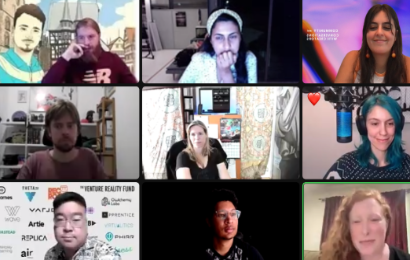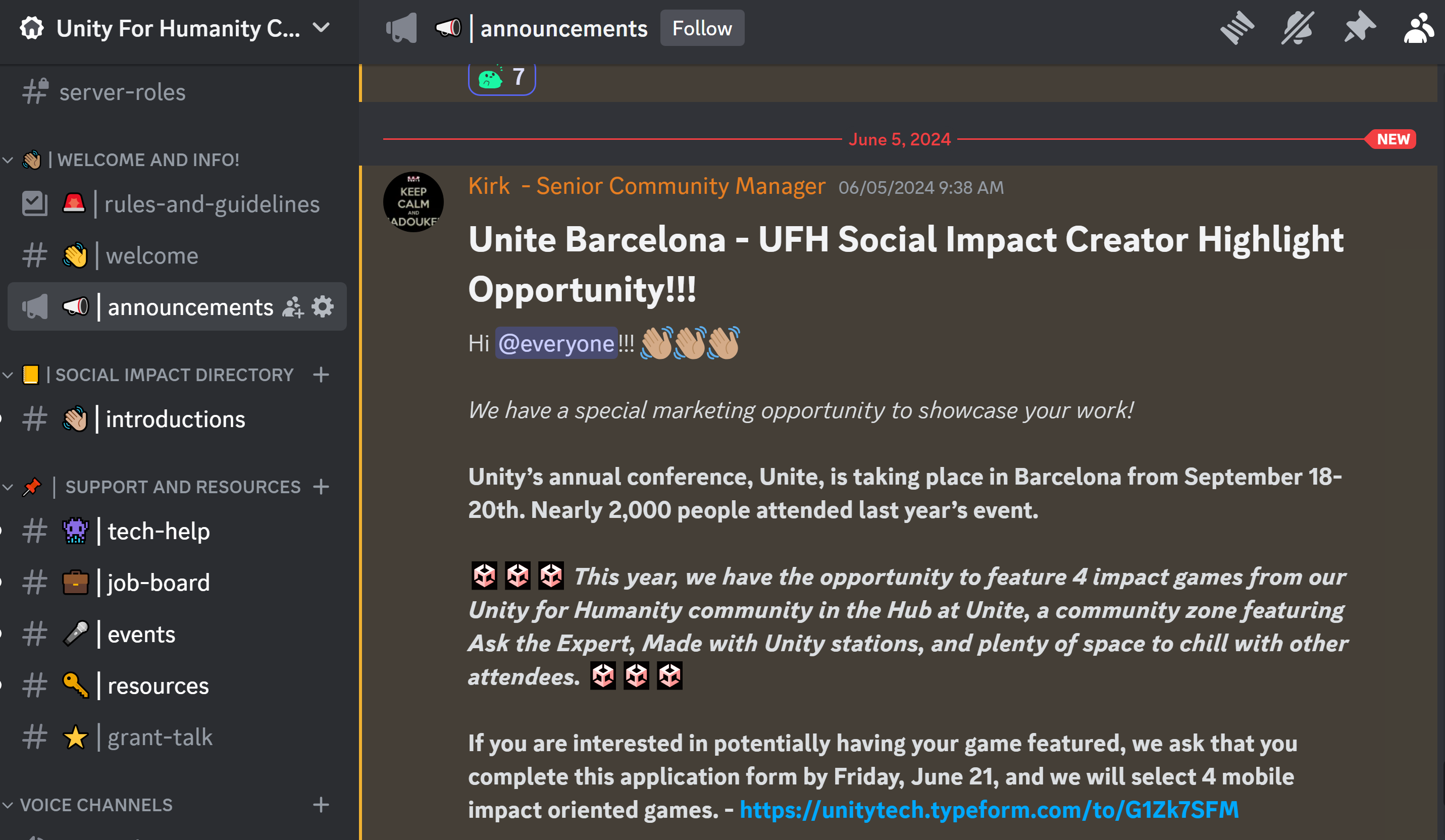
It begins, and ends, with community
Tutorial
·
Beginner
·
+10XP
·
15 mins
·
(96)
Unity Technologies

Learn about the value of community as you embark on your Unity for Humanity creator journey.
1. Introduction
Countless psychological research studies have proven that hard problems are nearly always easier to solve when you’re working on them with other people. Making video games is hard, so having a connection to a larger community is invaluable. In this tutorial, you will learn find and leverage communities.
2. Find your people
Whether you’re working on your own, with another person, or with a larger group, seek out fellow developers who will encourage you, assist you, and keep you accountable. These might be people on your team, people in your local community, or folks you find online. Don’t overlook the opportunity to engage with people who might not be game developers at all, but are engaged with the issues you’re exploring with your project.
At Unity for Humanity (UFH), we’ve created a thriving community online where creators who want to make impact-driven games and projects can connect and collaborate. If you’re not sure where to begin, joining the Unity for Humanity Discord server is a great place to start.

3. Find stakeholders
Try reaching out to folks that can advise or guide you in the area your game covers. You’re an expert in game development, not wetlands biodiversity (or whatever other topic your game might include), so finding a subject matter expert who is willing to interact with you can bring tons of benefits:
- Expertise and their networks of fellow enthusiasts.
- Encouragement and excitement.
- Accountability (having someone to share milestones with is great).
In our experience, experts are more than happy to help out. Experts will often be thrilled to support a project, but might have limited availability due to their professional or personal commitments. Show your stakeholders respect and keep them engaged in your project by:
- Defining their level of commitment up front. Will they contribute actual work, or just check in from time to time?
- Having a schedule of interactions. Ideally these are at a regular cadence and are synchronized with your milestones when you reach the production phase.
- Not relying solely on their knowledge. Make sure you are well-versed in the topic your project explores.
- Having more than one expert. Subject matter experts might find they have other priorities and need to step away from the project. Having someone else involved can really help avoid this problem.
Experts can be particularly valuable when it comes time to share and distribute your completed project, as their network will include other individuals who are passionate about the subject matter or are well-connected to the issue your game explores.
4. Find players
Remember that, especially as your project advances toward completion, the people you get to playtest your game shouldn’t be the people you collaborate with. The less contact a playtester has had with your game before they try it, the better. Finding these people, especially if they are part of your intended audience, can be really hard. However, don’t neglect the internet as a resource. If you’re comfortable sharing your software, you can have people download the game and play it while you watch over a video streaming service. Or you can use a system like Parsec, which allows people to remote play on your own machine.
You can find more resources on playtesting here, including subjects like survey design and how to analyze what you see in playtests.
5. Find like-minded organizations
When it comes to creating games with meaning, often this means creating a project that addresses a social issue; for example, mental health, sustainability, climate change, etc. One way to build support for your game while also building community is to get involved with a thematically aligned non-profit or charity organization. There are a number of reasons why this can be immensely helpful to the launch of your game:
- The organizations can share your game with their community members: folks who are already passionate about the topic you’re exploring.
- Alignment with a non-profit, charity, or other impact organization lends credibility to your project. Making a game about climate change? Collaborating with the UN environment programme is one way to make sure your game is taken seriously.
- Alignment with a non-profit or charity organization can support your fundraising goals. Often, grants are more likely to be awarded to projects that are associated with a
6. Stay connected
Go to meetups, join online communities, and have trusted friends and colleagues that you talk with regularly - even if you don’t have any particular news to share about your game. People will always be your best resource. Let’s hear from some Unity creators on why and how they use the community and the spaces and places they encourage you to check out.
Consider watching these videos to learn about the importance of the creative community in the game development process, as well as how to give and receive feedback as a member of a community.